'How about the smirk!' Brad Scott's amusing reaction to THAT last-second controversy
Brad Scott told journalists while the focus will be on the final play, he could cite a couple of other decisions that didn't go…
Opinion
We move now to the G team, which has a much more modern influence than we have seen so far.
Les Gardiner (Essendon 1943-53)
166 games, zero goals
Les Gardiner was a solid and dependable defender for Essendon over a decade, rotating between the back pocket and halfback flank. Blessed with good pace and plenty of courage, Gardiner won Essendon’s best first-year player in 1943 before missing all of 1944 through injury. Upon his return, he was an essential part of the Bombers’ mix, playing in three premierships (1946, 1949, 1950). In his final three years he was named as Essendon’s most unselfish player.
Darren Glass (West Coast 2000-14)
270 games, eight goals
For nearly 15 years Darren Glass was a rock in defence for West Coast, holding opposition attacks at bay and being recognised as All Australian on four occasions – also as captain in 2012. Glass didn’t have the name recognition of the more decorated midfielders of the Eagles, but his value was underlined by winning three best and fairest awards and captaining the club from 2008 to his retirement in 2014. He was also an important part of the 2006 premiership.
Josh Gibson (North Melbourne 2006-09, Hawthorn 2010-17)
225 games, five goals
An expert at reading the ball and coming on the scene with a timely spoil, Josh Gibson was a mature-age recruit for North Melbourne and was a solid defender for them before coming into his own at Hawthorn. He was a vital part of the Hawks’ threepeat, winning best and fairest awards in both 2013 and 2015. Gibson would regularly springboard Hawthorn’s attacks and was rarely threatened under pressure. He was named in the All Australian side for 2015, and retired in 2017 as injuries took hold.
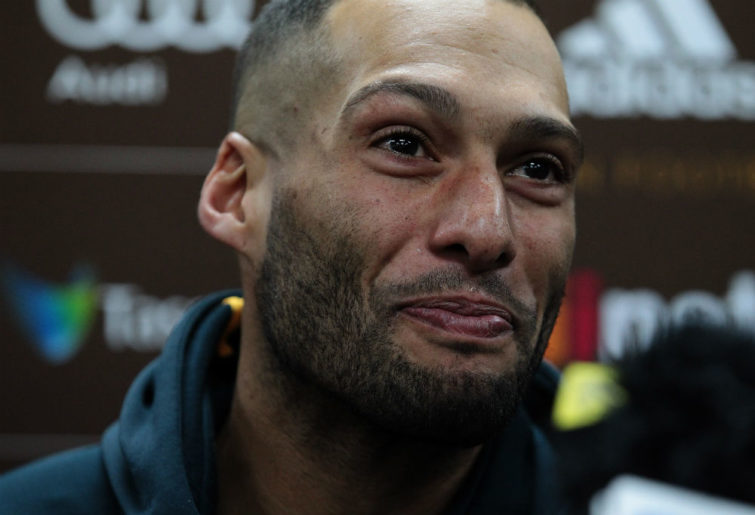
(AAP Image/Stefan Postles)
Brendon Goddard (St Kilda 2003-12, Essendon 2013-18)
334 games, 160 goals
Brendon Goddard’s career started in interesting circumstances, being drafted by St Kilda after Carlton was penalised for salary cap breaches as they were about to snap him up. He ended up becoming one of the Saints’ most skilful defenders slash midfielders, often rebounding well from the defensive 50 to set up an attack. Although he never won a best and fairest he was very well regarded, being named All Australian in 2009 and 2010 – the latter year featuring an iconic grand final mark late in the final quarter. After the 2012 season, Goddard departed to Essendon, where his leadership was greatly utilised as the club handled the fallout from the ASADA scandal. He won Essendon’s best and fairest in 2013 and was named captain for the 2016 season.
Ross Glendinning (North Melbourne 1978-86, West Coast 1987-88)
230 games, 325 goals
Ross Glendinning had intended to move to North Melbourne in 1977, but East Perth refused to clear him, insisting he play one more year with them. As such, he missed out on a premiership, with the Kangaroos winning over in the east and East Perth losing the WAFL grand final. Upon moving to North, though, Glendinning was a prominent player in any key position – kicking 59 goals in 1979 while also starring as an attacking centre halfback. It was in the latter role that Glendinning won the 1983 Brownlow Medal, as well as best and fairest awards in 1982 and 1983. When West Coast entered the VFL, Glendinning moved back west and led the club goal-kicking in their first two years while serving as their inaugural captain. Glendinning was named as centre halfback in North’s Team of the Century, and lends his name to the medal for best on ground in the Western Derby.
Lindsay Gilbee (Western Bulldogs 2001-12)
206 games, 119 goals
Lindsay Gilbee was an important member of the Bulldogs’ defence through the 2000s, often using a penetrative kick to rebound opposing attacks and set up a forward thrust. When possible, he could also drift forward for a pop at goal from outside 50 when receiving a teammate’s handball. Gilbee played in the Bulldogs’ unsuccessful preliminary finals of 2008, 2009 and 2010 before starting to lose form and retiring in 2012. In 2008 he had received offers to trial for punting in the NFL, but remained with the Dogs. He was named All Australian in 2006.
Simon Goodwin (Adelaide 1997-2010)
275 games, 162 goals
When Adelaide were threatening to blow the AFL wide open in the mid-2000s, Simon Goodwin was a big part of it. After playing in premierships in his first two seasons, Goodwin started to really attract notice in 2000 when he won his first club best and fairest award. Further awards would follow in 2005 and 2006, and Goodwin would be named All Australian on five occasions. He was appointed as club captain in 2008, and remained in the role until he retired. A consistent ball winner and capable of many a long goal, Goodwin is now the coach of the Melbourne Demons.
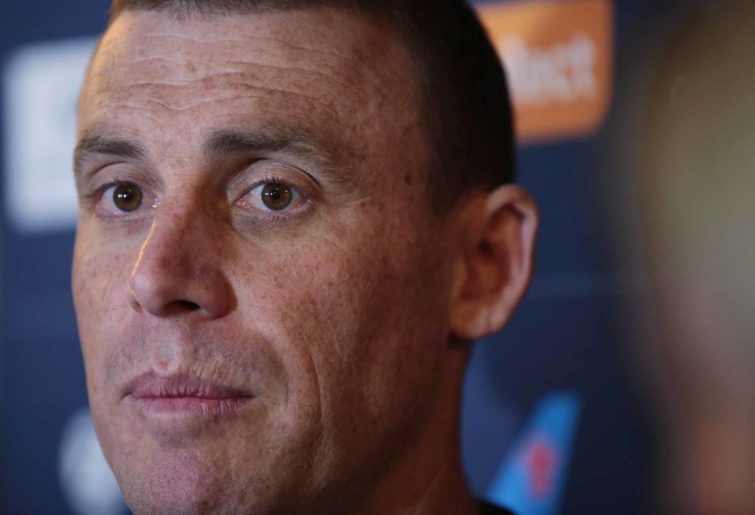
(AAP Image/Stefan Postles)
Edward ‘Carji’ Greeves (Geelong 1923-33)
124 games, 17 goals
For as long as the game is played, Edward ‘Carji’ Greeves’ name will be remembered as the first ever Brownlow Medalist, winning the award in 1924. Unlike many of his contemporaries, Greeves was equally adept on both sides of his body, and was noted for a classical kicking style so pleasing to the eye that Geelong schoolchildren would try for hours to mimic it. In his Brownlow year, Greeves also represented Victoria in the interstate carnival, and in 1928 was headhunted by America as the kicking coach for the USC Trojans. Greeves was a part of the 1925 and 1931 premiership sides, and was named in the centre of Geelong’s team of the century, and was further honoured by Geelong naming their best and fairest award after him.
Keith Greig (North Melbourne 1971-85)
294 games, 48 goals
For 15 years, the long-striding Keith Greig would deliver the ball into North Melbourne’s attacking zone and excite fans with his great pace and skill. Twice he won the Brownlow Medal, in 1973 and 1974, while not winning his club’s best and fairest in either season – he would go on to claim his only best and fairest in 1980 after the fractious relationship with coach Ron Barassi came to a head. Greig played in the 1975 premiership, and captained the club from 1976 to 1979 – but missed the 1977 premiership through injury. Greig retired in 1985 after injury dimmed his final years. He was named on the wing in North’s Team of the Century, as well as the VFL/AFL Team of the Century.
Alan ‘Butch’ Gale (Fitzroy 1948-61)
213 games, 19 goals
Alan Gale was better known as ‘Butch’ for the majority of his career as a tough and ruthless ruckman for Fitzroy. While he wasn’t as tall as many of the day, his fearlessness and gritty attitude endeared him to football fans across the city. While he never won a best and fairest award, he finished in second place an incredible seven times. In 1958, Gale gave a wholehearted effort in an ultimately futile attempt to defeat North Melbourne – he collapsed after the match and woke to see North’s president Phonse Tobin looking over him. Tobin was a notable funeral director in Melbourne! ‘Butch’ Gale went on to be a well known commentator, and was named as first ruck in Fitzroy’s Team of the Century.
Dick Grigg (Geelong 1904-14, 1921)
194 games, 64 goals
Dick Grigg spent much of his career at Geelong being looked upon as one of the best players in the game. Unfailingly fair and an excellent mark, he was the preeminent centreman of his day and won four Geelong best and fairest awards. Grigg played 130 consecutive games at one point in his career, which was a Geelong record to that point. After his retirement in 1914 he was persuaded to return in an attempt to help the club in its unsuccessful 1921 finals campaign. Grigg was named on the halfback flank of Geelong’s Team of the Century and was named a Geelong Hall of Fame Legend in 2007.
Bill Goggin (Geelong 1958-71)
248 games, 279 goals
The final member of a very Geelong-centric midfield is rover Bill Goggin. During the ’60s, a sequence of Polly Farmer to Goggin to Doug Wade was virtually a given in many a Cats game, with Goggin’s pace and precision passing an important part of the team’s success. He won two best and fairest awards and captained the club from 1968 to 1971. Goggin was a near automatic selection for Victoria, and would coach the state in the ’80s and ’90s. He played in the 1963 premiership, vying for best afield honours with Farmer, and would go on to be named as rover in Geelong’s Team of the Century.
Adam Goodes (Sydney 1999-2015)
372 games, 464 goals
Adam Goodes could play virtually anywhere on the field. Whether as a ruckman when he won his first Brownlow Medal in 2003, a midfielder for his second in 2006, or in the forward line, Goodes was always able to make an impact and was a crucial part of Sydney’s success. He had previously won the Rising Star award in 1999, blazing onto the scene before blossoming under Paul Roos. Goodes went on to win three best and fairest awards and lead the club’s goal-kicking twice, as well as playing in two premierships. His effort to kick a vital goal in the 2012 grand final with an injured knee will live long in Swans folklore.
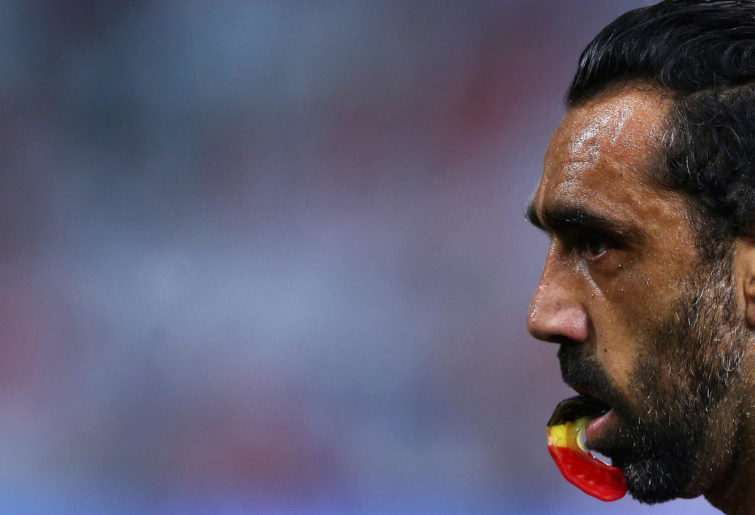
(Photo by Ryan Pierse/Getty Images)
Chris Grant (Footscray/Western Bulldogs 1990-2007)
341 games, 554 goals
A perfect example of the inexact science of drafting, Chris Grant was taken at pick 105 in 1988 and went on to kick over 50 goals in his first season – at 17 the youngest ever to do so. His star only brightened as the decade continued, as he moved out to centre half forward and used his strong marking and pinpoint skills to provide a focal point for the Dogs. He won best and fairest awards in 1994 and 1996 before suffering the dual blow of losing the 1997 preliminary final by a kick and becoming the only person in history to lead a Brownlow Medal count but not win the sward, after an innocuous strike earlier in the season was referred to the tribunal. As his career progressed, Grant would more often find himself in defence for a rebuilding Dogs outfit, and he captained the club from 2000 to 2004 before injury started to slow his career.
Brad Green (Melbourne 2000-12)
254 games, 350 goals
A little twinge of friction always hits me when I think of Brad Green, as his first significant act in the AFL was to help sink Carlton in the 2000 qualifying final with two goals in the last quarter. Over the next dozen years, Green’s penetrative skills were a vital part of Melbourne’s side as he developed into more of a midfield role. Green was a regular in the Australian International Rules squad, not hurt by his upbringing playing football with the round ball. He performed consistently throughout his career, peaking in 2010 when he led the club’s goal-kicking and won the best and fairest award. Green was named as captain for the 2011 season before retiring the following year.
Robbie Gray (Port Adelaide 2007-)
219 games, 318 goals
For the first half of his career, Robbie Gray was a skilled if inconsistent forward, sometimes struggling with injury and missing most of the 2012 season after leading the goal-kicking in 2011. In 2014 he started to break out, named All Australian for the first of four times and winning the first of three best and fairest awards. His creative play and ability to deliver the ball to teammates in better positions has seen him stamped as a genuine superstar of the game. There is plenty of time left for Gray to add to his accolades, but as it stands he is already one of the greatest players to have donned the Port jumper in the AFL.
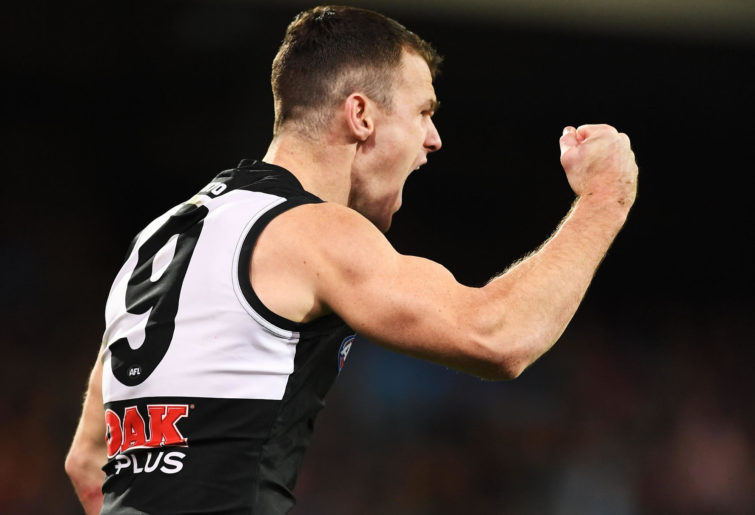
(Photo by Mark Brake/Getty Images)
Fraser Gehrig (West Coast 1995-2000, St Kilda 2001-08)
260 games, 549 goals
One of the cult figures of recent times, Fraser Gehrig was one of the most physical players of the era, using his strength to position himself well and attract the ball. Known as G-Train, he was an inconsistent forward as an Eagle despite being named All Australian in 1997, before making his name at St Kilda. His first year was at fullback, but after Grant Thomas shifted him forward he became the preeminent full forward for a few years, winning Coleman Medals in 2004 and 2005 and leading St Kilda’s goal-kicking every year from 2003 to 2007. It could be argued that his success cost St Kilda a shot at a flag in 2004, as they had the momentum in the preliminary final when Gehrig kicked his 100th goal for the season, prompting a crowd invasion and halting the game. His popularity with the Saints has been shown by the club’s Twitter feed providing a different photo of him each day until the resumption of the league.
Daniel Giansiracusa (Western Bulldogs 2001-14)
265 games, 331 goals
Daniel Giansiracusa was an important part of the Bulldogs’ side throughout the 2000s, using deft skills and good goal nous to pop up more often than not with a timely goal right when the team needed it. He was never a headline grabber, but his role in the Dogs’ set-up was never questioned. Towards the end of his career he became more of a playing assistant coach to develop the younger players around him. Giansiracusa led the club goal-kicking in 2012 and 2013 before retiring the following year and transitioning into an official assistant coach role.
Ben Graham (Geelong 1993-2004)
219 games, 145 goals
Ben Graham was a prodigious kick, being noted for his ability to top the 60-metre mark with regularity while playing in a key position for Geelong. At various stages of his career Graham would play as a forward, where he led the club’s goal-kicking in 2001, or as a defender, where he once kicked a ball in from a behind beyond the centre circle. He captained Geelong from 2000 to 2002, and still had plenty of good football left in him when he departed for America to try out as a punter in the NFL. Indeed, Graham became the first Australian to play in a Super Bowl, punting five times for a 36-yard average in Arizona’s loss to Pittsburgh.
Russell Greene (St Kilda 1974-80, Hawthorn 1980-88)
304 games, 134 goals
A flashy yet effective hard-running midfielder, Russell Greene debuted for St Kilda when he was only 16. He gave the club good service, but was cleared to Hawthorn halfway through the 1980 season and became a key part of their success over the decade. Greene played in three premierships (1983, 1986, 1988) and won a best and fairest award in 1984. He also represented Victoria in two years, and was named VFLPA MVP in 1984. Greene’s son Steven played 42 games between 2001-05.
Adrian Gallagher (Carlton 1964-72, Footscray 1973-75, North Melbourne 1976)
220 games, 274 goals
Adrian Gallagher was one third of one of the most famous ruck lines in history along with John Nicholls and Sergio Silvagni. Not pacy but very skilled at reading where the ball would be, Gallagher was a quality rover and led Carlton’s goal-kicking in 1966 and was a vital part in the club’s flags of 1968, 1970, and 1972. He won a best and fairest in 1970 before missing the opening match of the 1971 season due to a tiff with coach Ron Barassi. In 1973 Gallagher transferred to Footscray under the ten-year rule and was solid if unspectacular, before retiring in 1975 and having an abortive comeback in 1976. Gallagher was named as rover in Carlton’s Team of the Century.
Brodie Grundy (Collingwood 2013-)
133 games, 44 goals
There is still a long way to go in Brodie Grundy’s career, but his body of work to date has seen him become one of the top players in the league today. A strong ruckman whose work at ground level and in open play has seen him referred to as a fourth midfielder for the Magpies, Grundy has won the best and fairest in the last two years and has been seen as a Brownlow fancy in both 2018 and 2019. He was named in the 22 under 22 side for 2015 and 2016 and was named the Herald Sun player of the year in 2018.
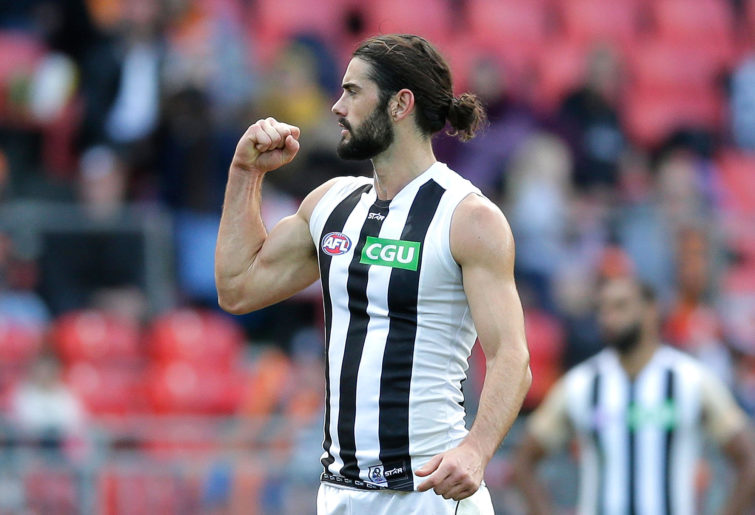
(Photo by Mark Metcalfe/Getty Images)
Heath Grundy (Sydney 2006-19)
256 games, 24 goals
After being rookie-listed by Sydney, Heath Grundy started his career as a forward and kicked three goals on debut. He struggled for form thereafter, and flourished when moved to the back line by coach Paul Roos. He was able to outmanoeuvre opponents with regularity to outmark them and repel opposing attacks. Grundy played in Sydney’s 2012 premiership and was a consistent part of the team’s defence through the decade until injury forced his retirement in 2019.
Brendon Gale (Richmond 1990-2001)
244 games, 209 goals
A wholehearted ruckman who stood tall for Richmond over a dozen years, Brendon Gale was just as strong in a key forward position. He was never a spectacular or eye-catching player, but an effective operator who represented Tasmania and the Allies in State of Origin matches through the 1990s. He is much more known these days as Richmond’s CEO and has overseen them becoming a powerhouse of the competition again. Gale is part of a famous footballing family in Tasmania, with brother Michael playing with Fitzroy and Richmond, and father Don one of the great names in Tasmanian history as the first in the NWFU to achieve All Australian selection.
Jack Graham (South Melbourne 1935-49)
227 games, 233 goals
The grandfather of teammate (in this exercise) Ben Graham, Jack Graham was a versatile and tough key position player for South Melbourne for 15 years. He played with equal effectiveness in the ruck, centre halfback or centre half forward, winning the club best and fairest as a ruckman in the losing grand final year of 1945. Graham captained the club from 1946 to 1948 and led the club goal-kicking in 1941 and 1948. He was notable as one of the last players in the league to use the place kick when shooting for goal.
Up next is the H team, with possibly one of the classiest half forward lines available and a very tough back line.